'At the heart of transport system design are people, not technology'

Milos Mladenovic, Assistant Professor of Transportation Engineering:
Our current transport system is not sustainable, not only ecologically but also socially and economically. We have succeeded in reducing emissions in many sectors, but transport emissions continue to grow.
A lifestyle based on private vehicle use also causes health problems. Besides lack of physical activity, sitting alone in a metal box separates us from others, often leading to psychological issues. At the same time, constructing parking areas in increasingly dense urban environments is a poor economic investment.
How did we end up here? Because we ― engineers, planners, architects and economists ― do not understand how multidimensional human beings are, and often end up developing our systems for the hypothetical ‘average’ person.
Emerging technologies, such as self-driving vehicles, drones, and mobility-as-a-service, are now revolutionising the transport sector. As their role and impact on society are still taking shape, we have the opportunity to reshape the rules of the game.
For many engineers, thinking about the relationship between technology and values feels foreign. Technology, however, is never neutral. There are value choices involved, which inevitably impact people’s behaviour and wellbeing. When designing new technological systems, there is always the question of what values we want ― and what values we don’t want ― to promote.
I ended up researching transport because it satisfies my endless curiosity: the research covers everything from physics to information technology and philosophy to sociology. There is no sector which does not in some way connect with the movement of people.
Training human-centred thinkers is key part of value-sensitive planning and design. For example, we are currently developing a new Europe-wide master’s programme in urban mobility, as part of the European Innovation and Technology Institute (EIT) to fill a huge need within the sector for a new generation of specialists.
In my research, I aim to help close the gap between research and practice. By creating cooperative networks, I maintain deep understanding of the challenges that transport service providers and city governments face. Among other things, I am helping draw up recommendations for the European Commission on the ethical challenges associated with self-driving vehicles.
We also need to have the organisations carrying out the practical work involved in our research projects from the very beginning, so future transport researchers are in touch with everyday challenges.
Text: Annamari Tolonen
Read more news

Learning to slow down: cold-water swimming benefits explored in new study
Swimming in cold water offers a temporal slowdown, promoting stress management and mental clarity that lingers long after the experience, says research from Finland.
The proxy server for remote access to e-resources is changing
If you have problems using e-resources, try accessing the e-resource using VPN connection.
A sustainable city is also age-friendly
Cities must involve older adults more strongly in the planning of the urban environment.






